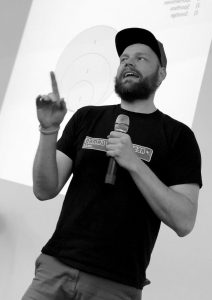Dejan Lukovic (born 03.08.1994) earned his bachelor’s degree in German Studies at the Leopold-Franzens-Universität Innsbruck and is enrolled in the two master programs “Media” and “Comparative Literary Studies”. He is currently working on his master thesis about human-machine-interactions in speedrunning.
Gotta Go Fast – Human-Machine-Interaction in Speedrunning
Lecture, Sunday, 20th October, 17:00 – 17:30
This paper focuses on the question of how one can make sense of the human-machine-interaction in speedrunning, especially in speedruns of virtual reality games. For this purpose, speedrunning is conceptualized as the act of completing a goal (most often a game) as fast as possible under certain rules as defined by the corresponding community of speedrunners.
In this endeavour to reach the fastest possible time speedrunners approach games differently to so called “casual runs” (normal playthroughs) and this fact thus changes how the runners and the machines are interacting with each other. Especially these changes in how runners act together with the machine are the focus of this paper, exemplified by the analysis of how these changes occur and how they can be described.
The hypothesis of this paper then is, that there are three distinct kinds of human-machine-interactions which occur during speedrunning and which depend on each other to constitute the phenomenon known as speedrunning. These findings will be accompanied by examples and analysis of speedruns – especially of virtual reality games – and the practices which runners perform within each speedrunning-community. This approach will allow for a better understanding of what happens during speedrunning, what it means to do so and how humans and machines interact while doing so.

 Rudolf Inderst studierte Politikwissenschaften, Neuere und Neuste Geschichte sowie Amerikanische Kulturgeschichte in München und Kopenhagen. Der an der LMU München und Universität Passau doppelt promovierte Spieleforscher leitet das Ressort Digitale Spiele bei dem Online-Kulturjournal nahaufnahmen.ch. Auf Twitter, Xbox Live und PlayStation Network findet man ihn als @BenFlavor.
Rudolf Inderst studierte Politikwissenschaften, Neuere und Neuste Geschichte sowie Amerikanische Kulturgeschichte in München und Kopenhagen. Der an der LMU München und Universität Passau doppelt promovierte Spieleforscher leitet das Ressort Digitale Spiele bei dem Online-Kulturjournal nahaufnahmen.ch. Auf Twitter, Xbox Live und PlayStation Network findet man ihn als @BenFlavor. Pascal Wagner hat einen M.A. in kultureller und kognitiver Linguistik sowie einen B.A. in Anglistik und Rechtwissenschaften an der Ludwig-Maximilians-Universität München absolviert. Seine Masterarbeit schrieb er über Lokalisation, Benennungsmotive und kulturelle Fixierung von Fantasieworten bei der Übersetzung digitaler Spiele aus dem Japanischen ins Englische und Deutsche. Er ist Gründer des Game Studies- und Wissenschaftskommunikations-Blogs languageatplay.de und Chefredakteur des Printmagazins für Videospielkultur GAIN – Games Inside. Auf Twitter ist er als @indieflock zu finden.
Pascal Wagner hat einen M.A. in kultureller und kognitiver Linguistik sowie einen B.A. in Anglistik und Rechtwissenschaften an der Ludwig-Maximilians-Universität München absolviert. Seine Masterarbeit schrieb er über Lokalisation, Benennungsmotive und kulturelle Fixierung von Fantasieworten bei der Übersetzung digitaler Spiele aus dem Japanischen ins Englische und Deutsche. Er ist Gründer des Game Studies- und Wissenschaftskommunikations-Blogs languageatplay.de und Chefredakteur des Printmagazins für Videospielkultur GAIN – Games Inside. Auf Twitter ist er als @indieflock zu finden. Alexander Pfeiffer is recipient of a Max Kade Fellowship awarded by the Austrian Academy of Science to work at MIT with The Education Arcade. His research focus as a postdoctoral fellow at MIT is on blockchain technologies and their impact on game-based education and learning assessment.
Alexander Pfeiffer is recipient of a Max Kade Fellowship awarded by the Austrian Academy of Science to work at MIT with The Education Arcade. His research focus as a postdoctoral fellow at MIT is on blockchain technologies and their impact on game-based education and learning assessment. Katharina Bisset is geek, lawyer, translator and all-round creative. Early on in law school she focused on what interested her most: the legal implications of technology. She’s been working in IT-, IP-, Media-, and Data Privacy Law since 2002, whilst never giving up her side passions, whether that’s podcasting, photography, publishing fiction and writing the occasional line of code. With Nerds of Law, equally IT-minded lawyers are working on LegalTech in an effort to bring technology and lawyers together. In some moments of free time she writes on her dissertation about the Open Source Software License GPL. As Associate she advises clients in her areas of expertise, from software licensing contracts to privacy policies and, if necessary, representing them in court.
Katharina Bisset is geek, lawyer, translator and all-round creative. Early on in law school she focused on what interested her most: the legal implications of technology. She’s been working in IT-, IP-, Media-, and Data Privacy Law since 2002, whilst never giving up her side passions, whether that’s podcasting, photography, publishing fiction and writing the occasional line of code. With Nerds of Law, equally IT-minded lawyers are working on LegalTech in an effort to bring technology and lawyers together. In some moments of free time she writes on her dissertation about the Open Source Software License GPL. As Associate she advises clients in her areas of expertise, from software licensing contracts to privacy policies and, if necessary, representing them in court. MMag. Dr. Alexander Preisinger ist Senior Lecturer am Institut für Geschichte der Universität Wien im Bereich Geschichtsdidaktik und Lehrer an einer Wiener HAK.
MMag. Dr. Alexander Preisinger ist Senior Lecturer am Institut für Geschichte der Universität Wien im Bereich Geschichtsdidaktik und Lehrer an einer Wiener HAK. Mag. Florian Aumayr studierte die Lehramtsfächer Latein und Geschichte, Sozialkunde und politische Bildung an der Universität Wien. Derzeit arbeitet er als wissenschaftlicher Mitarbeiter.
Mag. Florian Aumayr studierte die Lehramtsfächer Latein und Geschichte, Sozialkunde und politische Bildung an der Universität Wien. Derzeit arbeitet er als wissenschaftlicher Mitarbeiter. Felix Schniz is the director of studies and co-founder of the master’s programme Game Studies and Engineering at the University of Klagenfurt. He originally graduated as a Bachelor of Arts in English and American studies from the University of Mannheim, where he subsequently joined the master’s programme Cultural Transformations of the Modern Age: Literature and Media. With a thesis exploring the metamodern tendencies of the third-person shooter Spec Ops: The Line (2012), he concluded the programme with excellence. Today, Felix Schniz furthermore is a PhD candidate and research assistant at University of Klagenfurt, as well head of the Klagenfurt Critical Game Lab. The focus of his dissertation are experiential dimensions of videogames.
Felix Schniz is the director of studies and co-founder of the master’s programme Game Studies and Engineering at the University of Klagenfurt. He originally graduated as a Bachelor of Arts in English and American studies from the University of Mannheim, where he subsequently joined the master’s programme Cultural Transformations of the Modern Age: Literature and Media. With a thesis exploring the metamodern tendencies of the third-person shooter Spec Ops: The Line (2012), he concluded the programme with excellence. Today, Felix Schniz furthermore is a PhD candidate and research assistant at University of Klagenfurt, as well head of the Klagenfurt Critical Game Lab. The focus of his dissertation are experiential dimensions of videogames. Damian Stewart is a New Zealand-born Wiener. As well as being a veteran of the Austrian and New Zealand game industries, he has worked as a software engineer for interactive design, AR and VR projects, and as a professional artist and musician. Damian is currently studying toward an MA in Anglophone Literatures and Cultures at the University of Vienna.
Damian Stewart is a New Zealand-born Wiener. As well as being a veteran of the Austrian and New Zealand game industries, he has worked as a software engineer for interactive design, AR and VR projects, and as a professional artist and musician. Damian is currently studying toward an MA in Anglophone Literatures and Cultures at the University of Vienna. Harald is a games researcher, media pedagogue and cultural mediator based in Graz, Austria. He works for the Styrian Government as an expert in digital culture.
Harald is a games researcher, media pedagogue and cultural mediator based in Graz, Austria. He works for the Styrian Government as an expert in digital culture. Birkner, Achim, MA, Lehrkraft für besondere Aufgaben am Lehrstuhl Medien- und Erwachsenenbildung, Fakultät für Humanwissenschaften, Otto-von-Guericke-Universität Madgeburg.
Birkner, Achim, MA, Lehrkraft für besondere Aufgaben am Lehrstuhl Medien- und Erwachsenenbildung, Fakultät für Humanwissenschaften, Otto-von-Guericke-Universität Madgeburg.